牛津译林版九年级英语下册 Unit 1 Asia Grammar 课件(共35张PPT)
文档属性
| 名称 | 牛津译林版九年级英语下册 Unit 1 Asia Grammar 课件(共35张PPT) | 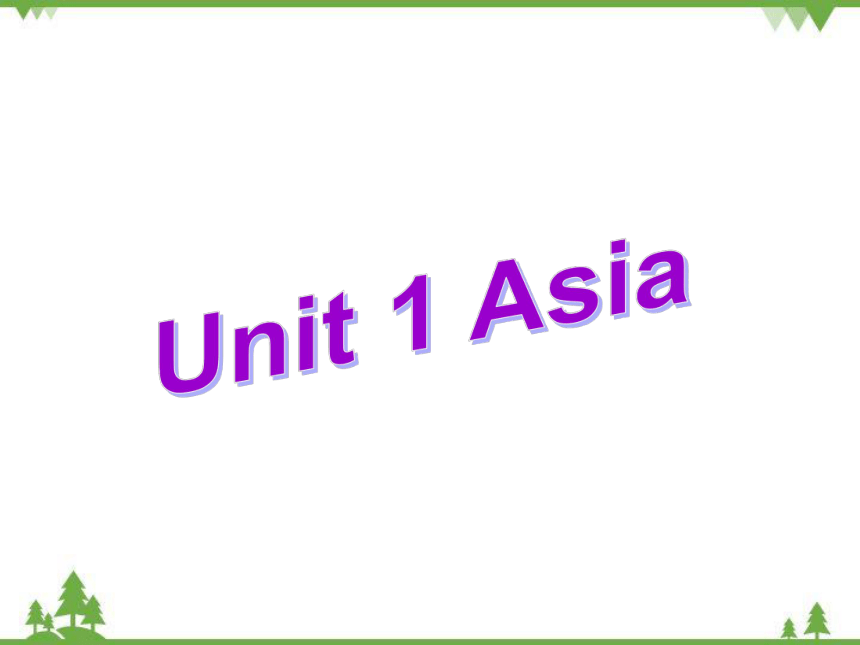 | |
| 格式 | ppt | ||
| 文件大小 | 1.4MB | ||
| 资源类型 | 教案 | ||
| 版本资源 | 牛津译林版 | ||
| 科目 | 英语 | ||
| 更新时间 | 2022-04-14 20:36:34 | ||
图片预览

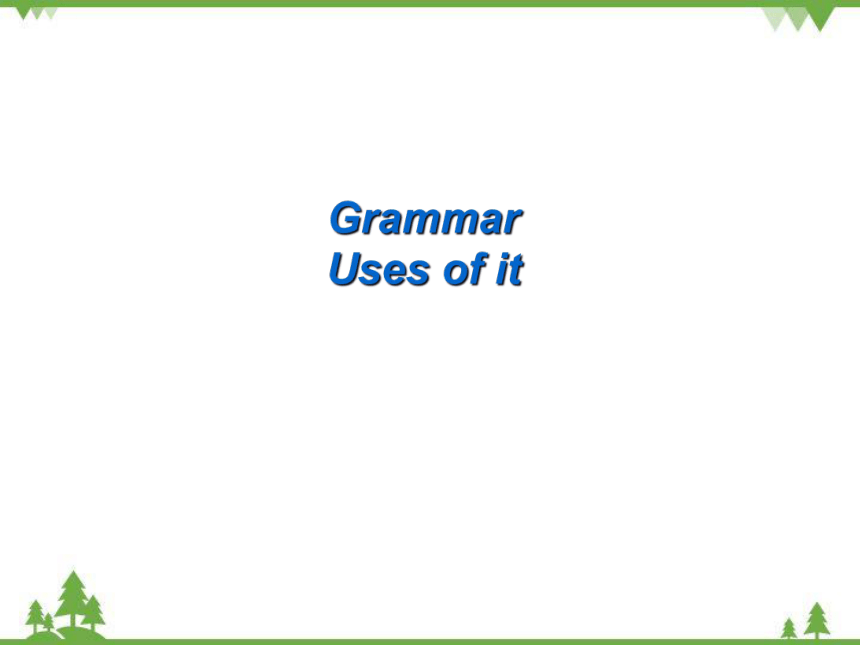
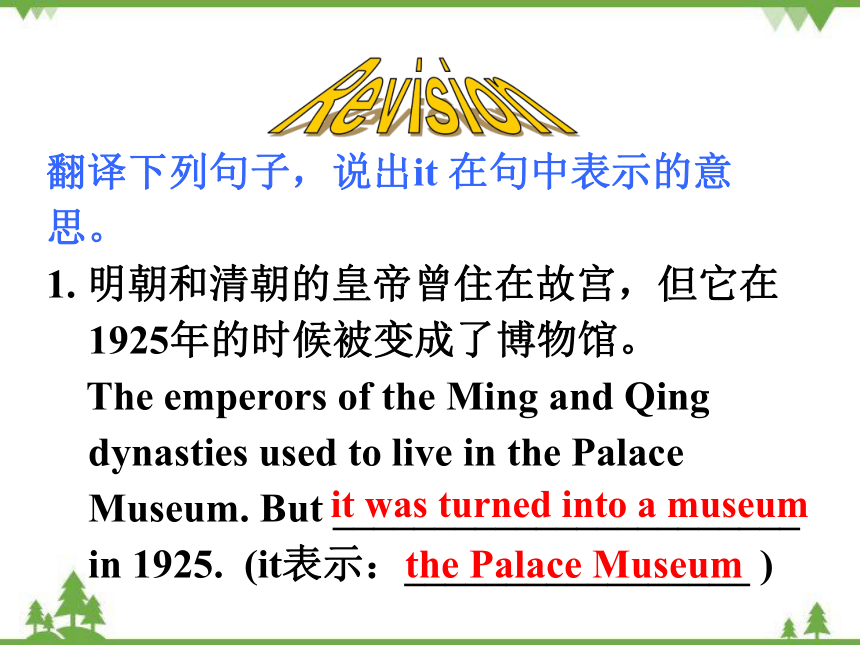
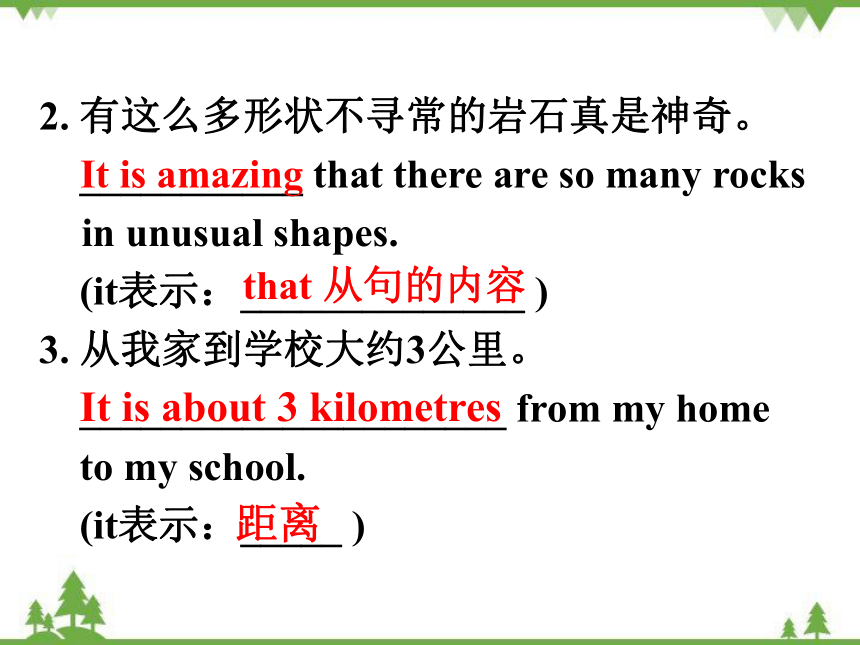
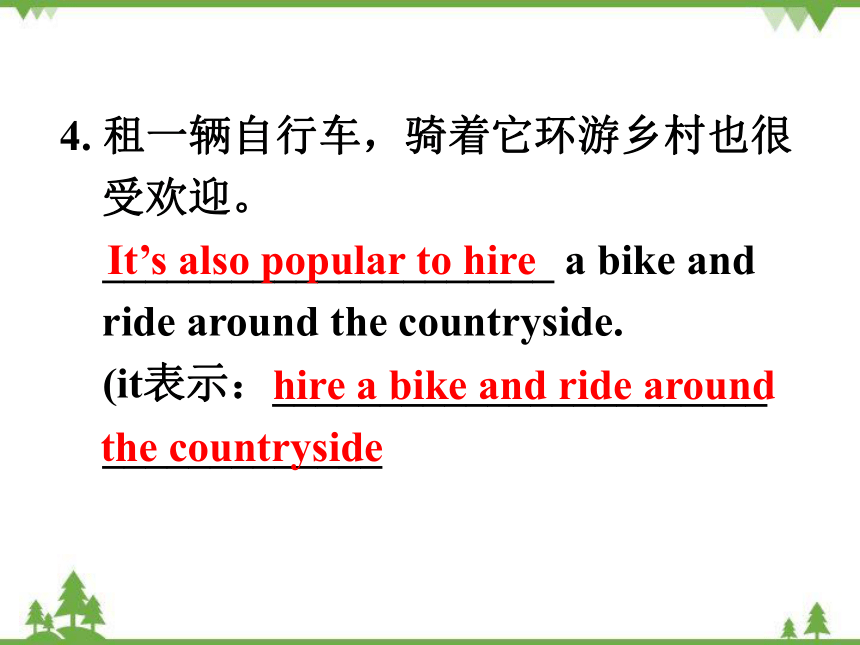
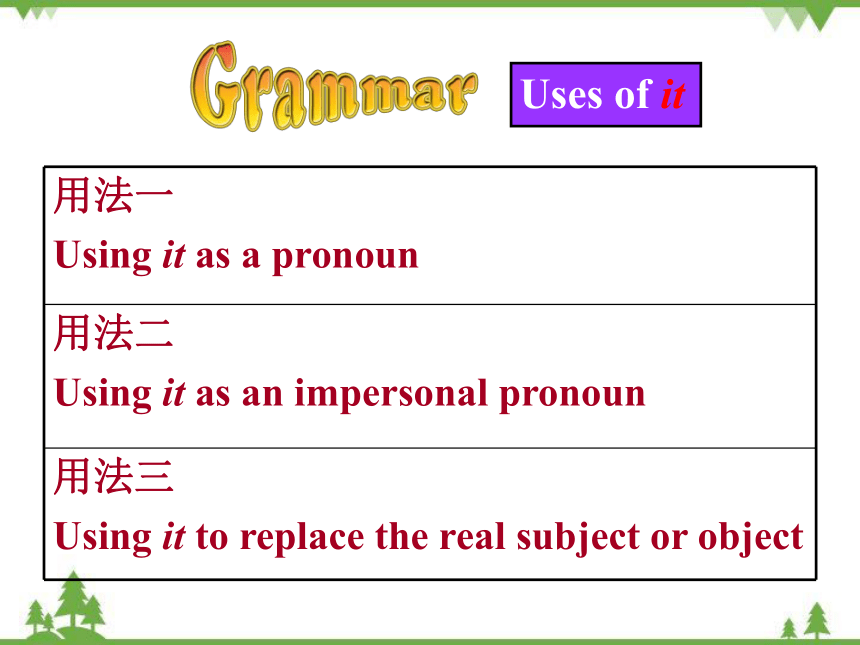

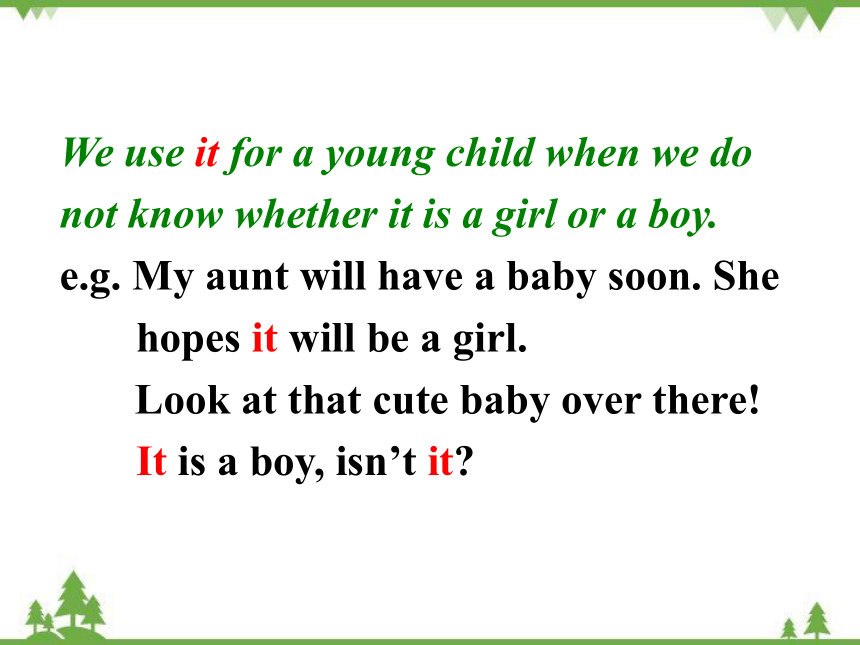

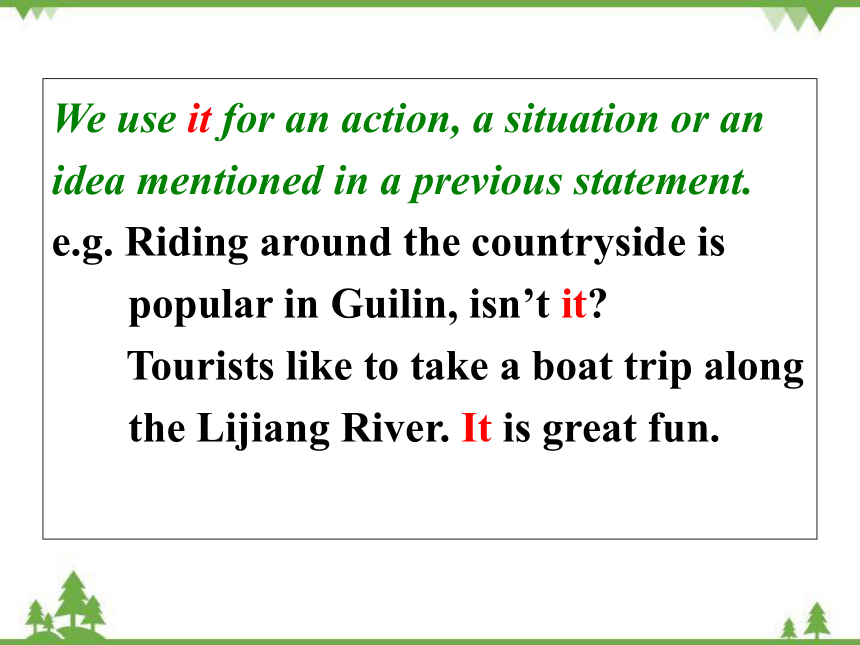
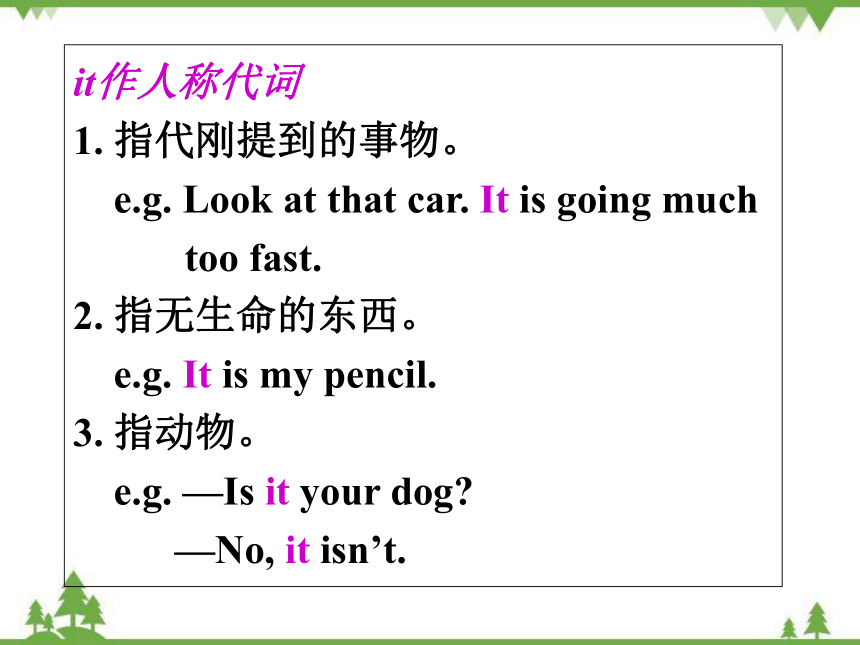
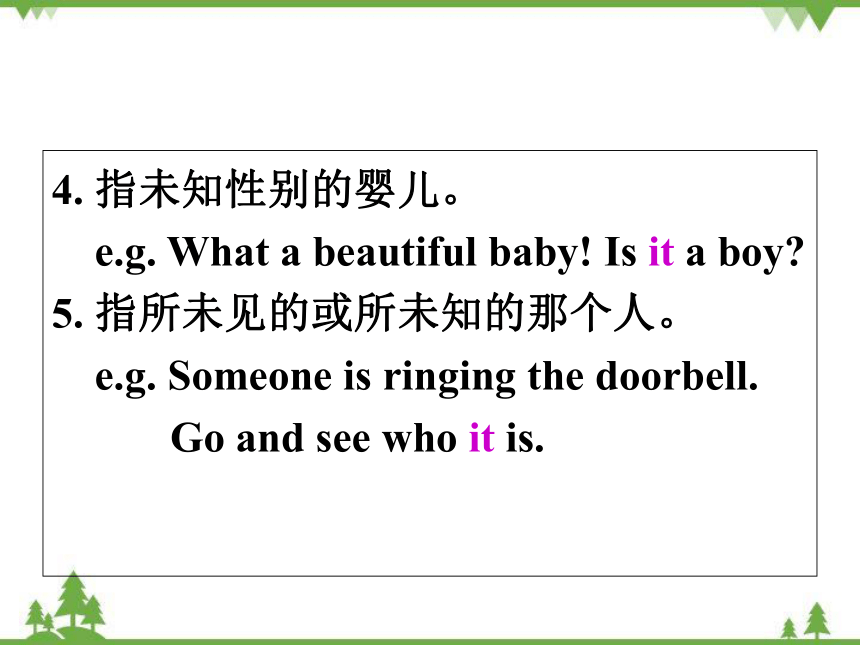
文档简介
(共35张PPT)
Grammar
Uses of it
翻译下列句子,说出it 在句中表示的意
思。
1. 明朝和清朝的皇帝曾住在故宫,但它在1925年的时候被变成了博物馆。
The emperors of the Ming and Qing dynasties used to live in the Palace Museum. But _______________________ in 1925. (it表示:_________________ )
it was turned into a museum
the Palace Museum
2. 有这么多形状不寻常的岩石真是神奇。
___________ that there are so many rocks in unusual shapes.
(it表示:______________ )
3. 从我家到学校大约3公里。
_____________________ from my home
to my school.
(it表示:_____ )
It is amazing
that 从句的内容
It is about 3 kilometres
距离
4. 租一辆自行车,骑着它环游乡村也很受欢迎。
_____________________ a bike and ride around the countryside.
(it表示:_______________________
_____________
It’s also popular to hire
hire a bike and ride around the countryside
Uses of it
用法一
Using it as a pronoun
用法二
Using it as an impersonal pronoun
用法三
Using it to replace the real subject or object
Using it as a pronoun
We use it for animals and lifeless things.
e.g. Look at the panda. It is so small.
Another famous attraction is the Great Wall. It runs for over 6,000 kilometres across the northern China.
We use it for a young child when we do
not know whether it is a girl or a boy.
e.g. My aunt will have a baby soon. She hopes it will be a girl.
Look at that cute baby over there! It is a boy, isn’t it
We use it for an unknown person.
e.g. — Who was calling you on the
phone just now
— It was my cousin.
We use it for an action, a situation or an
idea mentioned in a previous statement.
e.g. Riding around the countryside is popular in Guilin, isn’t it
Tourists like to take a boat trip along the Lijiang River. It is great fun.
it作人称代词
1. 指代刚提到的事物。
e.g. Look at that car. It is going much
too fast.
2. 指无生命的东西。
e.g. It is my pencil.
3. 指动物。
e.g. —Is it your dog
—No, it isn’t.
4. 指未知性别的婴儿。
e.g. What a beautiful baby! Is it a boy
5. 指所未见的或所未知的那个人。
e.g. Someone is ringing the doorbell.
Go and see who it is.
The exchange students visited the Summer Palace yesterday. Kevin is writing about it. Read the passage below and find out what each it refers to. Write your answers in the blanks.
Yesterday we visited the Summer Palace and spent about three hours in it. The palace is a Chinese garden and mainly includes a hill and a lake. The lake is very big— it takes up three quarters of the area. It was frozen, so we could not row a boat there. It was really a pity.
1.______________
2. ________
3. ________
4. _____________
______
the Summer Palace
the lake
the lake
we could not row a boat
Across the lake is a 17-hole bridge. There are many stone lions on either side of it. The lions are all different from each other. Isn’t it amazing While I was walking along the bridge, my mobile phone rang. It was my mum. I told her that the Summer Palace was well worth visiting.
5. __________
6. ___________
7._______________
the bridge
The lions are different
from each other.
an unknown person
Using it as an impersonal pronoun
We also use it for the time, the date, the
weather, the distance, etc.
e.g. It is 6:30 p.m. It is raining heavily outside.
It is 1 January today. It is New Year’s Day.
In Beijing, it is cold and windy in winter.
It is two kilometres from my school to my home.
it作非人称代词
1. 指天气。
e.g. It’s raining.
2. 指时间。
e.g. It’s half past eight.
3. 指环境。
e.g. It’s quiet here.
4. 指距离。
e.g. How far is it from your home to your
office
The exchange students left for Shanghai. Kevin has made some notes in his diary. Rewrite his sentences with it.
1. Today is 22 February. We left Beijing for Shanghai early in the morning.
____________________. We left Beijing for Shanghai early in the morning.
2. Shanghai is about 1, 300 kilometres from Beijing.
________________________ from Beijing to Shang hai.
It is 22 February today
It is about 1, 300 kilometres
3. I woke up at 5 a.m. this morning.
__________ when I woke up this morning.
4. I felt a little cold when we went out. The temperature was only 2℃.
I felt a little cold when we went out. _____________.
5. Winter is very cold and dry in Beijing.
In winter, ___________________________.
It was 5 a.m.
It was only 2℃
it is very cold and dry in Beijing
6. We arrived in Shanghai on a sunny day.
________________ when we arrived in
Shanghai.
7. We got to our hotel at noon.
__________ when we got to our hotel.
8. Our hotel is not far from the Bund.
__________ from the Bund to our hotel.
It was noon
It is not far
It was a sunny day
Using it to replace the real subject or object
Sometimes we use it to replace the real subject or object in a sentence. In this situation, we put the real subject or object later in the sentence in the form of a to-infinitive or a clause.
e.g. It is very tiring to climb the steps.
It is popular to hire a bicycle and ride around the countryside.
It is amazing that there are so many rocks in unusual shapes in the cave.
Many people find it pleasant to travel around.
Useful structures with it
It is + adjective + (of/ for…) + to…
It takes… some time to…
It is said/ reported/… that…
…think(s)/ find(s) it easy/ difficult/… to…
it作形式主语或形式宾语
有时为了保持句子的平衡,常用it作形式主语或形式宾语,而把真正的主语或宾语放到句子的后面。
1. 形式主语。
e.g. It’s his duty to look after the sick
boy.
2. 形式宾语。
e.g. I find it quite easy to get on with
Tom.
Miss Thompson, a British teacher travelling with the exchange students, is writing down what she thinks about Shanghai. Help her complete her notes with it.
Traffic: The traffic is often busy, but public transport here is quite good, so ________ (easy) for people to get around.
Weather: __________ (sunny) and warm. We like ____ here.
Environment: ________ (said) that the air is not clean here, but I do not think the pollution is as serious as I imagined.
it is easy
It is sunny
it
It is said
Signs: Shanghai is beautiful. ________ (fun) to ride around the city and visit the interesting places.
Food: Chinese food is delicious. I will ask my family to go to a Chinese restaurant and try ____ when I get back.
It’s fun
it
Hotel: We all think ______________ (comfortable) to stay in this hotel. They provide a high level of service.
People: The local people are friendly. ________ (kind) of them to answer all our questions.
it’s comfortable
It’s kind
n. 水平
n. 服务,工作
1. The lake is very big — it takes up three quarters of the area.
湖很大,占了四分之三的面积。
take up 占据(空间);占用(时间)
e.g. The table takes up too much space.
这张桌子太占地方了。
quarter n. 四分之一
2. Across the lake is a 17-hole bridge. There are many stone lions on either side of it.
湖上有一座十七孔桥,桥两边有很多石狮子。
倒装句。表示方位的词或短语置于句首时,句子要完全倒装。
e.g. On the wall are pictures.
注意:主语为代词时不倒装。
e.g. Out he rushed.
either det. & pron. 两者之一
either… or… 不是……就是……
on either side of = on both sides of
e.g. You may take either of the roads.
两条路你走哪一条都行。
Tom is going to buy either a guitar or a piano.
汤姆不是要买一把吉他就是一架钢琴。
下列句中it的用法是什么?选出对应选项。
( ) 1. It’s Tuesday today.
( ) 2. It’s two miles to the beach.
( ) 3. Yesterday I bought a bag. It’s red.
( ) 4. It’s better to be early.
刚提到的东西 b. 所未见或未知的人
c. 动物 d. 天气 e. 时间 f. 环境
g. 距离 h. 作形式主语或形式宾语
e
g
a
h
( ) 5. It’s cold today.
( ) 6. It’s Lily’s dog.
( ) 7. I think it necessary to visit Mr Wang.
( ) 8. It gets very crowded here in the summer.
( ) 9. —Oh, by the way, there was a telephone call for you.
—Who was it
i
d
c
b
f
Summarize the uses of it, and make some sentences.
Grammar
Uses of it
翻译下列句子,说出it 在句中表示的意
思。
1. 明朝和清朝的皇帝曾住在故宫,但它在1925年的时候被变成了博物馆。
The emperors of the Ming and Qing dynasties used to live in the Palace Museum. But _______________________ in 1925. (it表示:_________________ )
it was turned into a museum
the Palace Museum
2. 有这么多形状不寻常的岩石真是神奇。
___________ that there are so many rocks in unusual shapes.
(it表示:______________ )
3. 从我家到学校大约3公里。
_____________________ from my home
to my school.
(it表示:_____ )
It is amazing
that 从句的内容
It is about 3 kilometres
距离
4. 租一辆自行车,骑着它环游乡村也很受欢迎。
_____________________ a bike and ride around the countryside.
(it表示:_______________________
_____________
It’s also popular to hire
hire a bike and ride around the countryside
Uses of it
用法一
Using it as a pronoun
用法二
Using it as an impersonal pronoun
用法三
Using it to replace the real subject or object
Using it as a pronoun
We use it for animals and lifeless things.
e.g. Look at the panda. It is so small.
Another famous attraction is the Great Wall. It runs for over 6,000 kilometres across the northern China.
We use it for a young child when we do
not know whether it is a girl or a boy.
e.g. My aunt will have a baby soon. She hopes it will be a girl.
Look at that cute baby over there! It is a boy, isn’t it
We use it for an unknown person.
e.g. — Who was calling you on the
phone just now
— It was my cousin.
We use it for an action, a situation or an
idea mentioned in a previous statement.
e.g. Riding around the countryside is popular in Guilin, isn’t it
Tourists like to take a boat trip along the Lijiang River. It is great fun.
it作人称代词
1. 指代刚提到的事物。
e.g. Look at that car. It is going much
too fast.
2. 指无生命的东西。
e.g. It is my pencil.
3. 指动物。
e.g. —Is it your dog
—No, it isn’t.
4. 指未知性别的婴儿。
e.g. What a beautiful baby! Is it a boy
5. 指所未见的或所未知的那个人。
e.g. Someone is ringing the doorbell.
Go and see who it is.
The exchange students visited the Summer Palace yesterday. Kevin is writing about it. Read the passage below and find out what each it refers to. Write your answers in the blanks.
Yesterday we visited the Summer Palace and spent about three hours in it. The palace is a Chinese garden and mainly includes a hill and a lake. The lake is very big— it takes up three quarters of the area. It was frozen, so we could not row a boat there. It was really a pity.
1.______________
2. ________
3. ________
4. _____________
______
the Summer Palace
the lake
the lake
we could not row a boat
Across the lake is a 17-hole bridge. There are many stone lions on either side of it. The lions are all different from each other. Isn’t it amazing While I was walking along the bridge, my mobile phone rang. It was my mum. I told her that the Summer Palace was well worth visiting.
5. __________
6. ___________
7._______________
the bridge
The lions are different
from each other.
an unknown person
Using it as an impersonal pronoun
We also use it for the time, the date, the
weather, the distance, etc.
e.g. It is 6:30 p.m. It is raining heavily outside.
It is 1 January today. It is New Year’s Day.
In Beijing, it is cold and windy in winter.
It is two kilometres from my school to my home.
it作非人称代词
1. 指天气。
e.g. It’s raining.
2. 指时间。
e.g. It’s half past eight.
3. 指环境。
e.g. It’s quiet here.
4. 指距离。
e.g. How far is it from your home to your
office
The exchange students left for Shanghai. Kevin has made some notes in his diary. Rewrite his sentences with it.
1. Today is 22 February. We left Beijing for Shanghai early in the morning.
____________________. We left Beijing for Shanghai early in the morning.
2. Shanghai is about 1, 300 kilometres from Beijing.
________________________ from Beijing to Shang hai.
It is 22 February today
It is about 1, 300 kilometres
3. I woke up at 5 a.m. this morning.
__________ when I woke up this morning.
4. I felt a little cold when we went out. The temperature was only 2℃.
I felt a little cold when we went out. _____________.
5. Winter is very cold and dry in Beijing.
In winter, ___________________________.
It was 5 a.m.
It was only 2℃
it is very cold and dry in Beijing
6. We arrived in Shanghai on a sunny day.
________________ when we arrived in
Shanghai.
7. We got to our hotel at noon.
__________ when we got to our hotel.
8. Our hotel is not far from the Bund.
__________ from the Bund to our hotel.
It was noon
It is not far
It was a sunny day
Using it to replace the real subject or object
Sometimes we use it to replace the real subject or object in a sentence. In this situation, we put the real subject or object later in the sentence in the form of a to-infinitive or a clause.
e.g. It is very tiring to climb the steps.
It is popular to hire a bicycle and ride around the countryside.
It is amazing that there are so many rocks in unusual shapes in the cave.
Many people find it pleasant to travel around.
Useful structures with it
It is + adjective + (of/ for…) + to…
It takes… some time to…
It is said/ reported/… that…
…think(s)/ find(s) it easy/ difficult/… to…
it作形式主语或形式宾语
有时为了保持句子的平衡,常用it作形式主语或形式宾语,而把真正的主语或宾语放到句子的后面。
1. 形式主语。
e.g. It’s his duty to look after the sick
boy.
2. 形式宾语。
e.g. I find it quite easy to get on with
Tom.
Miss Thompson, a British teacher travelling with the exchange students, is writing down what she thinks about Shanghai. Help her complete her notes with it.
Traffic: The traffic is often busy, but public transport here is quite good, so ________ (easy) for people to get around.
Weather: __________ (sunny) and warm. We like ____ here.
Environment: ________ (said) that the air is not clean here, but I do not think the pollution is as serious as I imagined.
it is easy
It is sunny
it
It is said
Signs: Shanghai is beautiful. ________ (fun) to ride around the city and visit the interesting places.
Food: Chinese food is delicious. I will ask my family to go to a Chinese restaurant and try ____ when I get back.
It’s fun
it
Hotel: We all think ______________ (comfortable) to stay in this hotel. They provide a high level of service.
People: The local people are friendly. ________ (kind) of them to answer all our questions.
it’s comfortable
It’s kind
n. 水平
n. 服务,工作
1. The lake is very big — it takes up three quarters of the area.
湖很大,占了四分之三的面积。
take up 占据(空间);占用(时间)
e.g. The table takes up too much space.
这张桌子太占地方了。
quarter n. 四分之一
2. Across the lake is a 17-hole bridge. There are many stone lions on either side of it.
湖上有一座十七孔桥,桥两边有很多石狮子。
倒装句。表示方位的词或短语置于句首时,句子要完全倒装。
e.g. On the wall are pictures.
注意:主语为代词时不倒装。
e.g. Out he rushed.
either det. & pron. 两者之一
either… or… 不是……就是……
on either side of = on both sides of
e.g. You may take either of the roads.
两条路你走哪一条都行。
Tom is going to buy either a guitar or a piano.
汤姆不是要买一把吉他就是一架钢琴。
下列句中it的用法是什么?选出对应选项。
( ) 1. It’s Tuesday today.
( ) 2. It’s two miles to the beach.
( ) 3. Yesterday I bought a bag. It’s red.
( ) 4. It’s better to be early.
刚提到的东西 b. 所未见或未知的人
c. 动物 d. 天气 e. 时间 f. 环境
g. 距离 h. 作形式主语或形式宾语
e
g
a
h
( ) 5. It’s cold today.
( ) 6. It’s Lily’s dog.
( ) 7. I think it necessary to visit Mr Wang.
( ) 8. It gets very crowded here in the summer.
( ) 9. —Oh, by the way, there was a telephone call for you.
—Who was it
i
d
c
b
f
Summarize the uses of it, and make some sentences.
